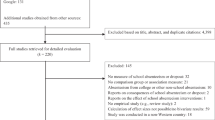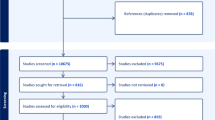Abstract
Objective
To describe the associations between a range of baseline factors (demographic, family and clinical) and parent-reported health-related quality of life (HRQoL) of children with ADHD taking part in the ADORE study.
Methods
HRQoL was rated using the Parent Report Form of the Child Health and Illness Profile-Child Edition (CHIP-CE). Forward-stepwise linear regression models were used to investigate associations with 26 independent variables. Separate models were fitted for each of the five CHIP-CE domains (Satisfaction, Comfort, Resilience, Risk Avoidance and Achievement) and two subdomains of Achievement (Academic Performance and Peer Relations).
Results
CHIP-CE domain mean scores were lower than community norms, especially for Risk Avoidance and Achievement, indicating a low level of HRQoL. Clinical factors significantly associated with a poorer HRQoL included ADHD symptoms (inattention, hyperactivity-impulsivity), conduct problems, peer relationship problems, having asthma, multiple other somatic symptoms and co-ordination problems. Family factors, such as having a parent with a health or mental health problem possibly caused by the child's illness, child not living with both parents and maternal smoking during pregnancy were also associated with a worse HRQoL in some CHIP-CE domains/subdomains.
Conclusions
Numerous factors independently impact on the HRQoL of children with ADHD.
Similar content being viewed by others
Abbreviations
- ADHD:
-
Attention-Deficit/Hyperactivity Disorder
- ADORE:
-
Attention-deficit/hyperactivity Disorder Observational Research in Europe
- ADHD-RS:
-
ADHD Rating Scale
- CD:
-
Conduct Disorder
- CGAS:
-
Children's Global Assessment Scale
- CGI-S:
-
Clinical Global Impression-Severity scale
- CHIP-CE:
-
Child Health and Illness Profile – Child Edition
- HRQoL:
-
Health-Related Quality of Life
- ODD:
-
Oppositional Defiant Disorder
- PRF:
-
Parent Report Form
- SDQ:
-
Strengths and Difficulties Questionnaire
References
Barkley RA (1998) Attention-deficit hyperactivity disorder. Sci Am 279:66–71
Becker A, Steinhausen HC, Baldursson G, Dalsgaard S, Lorenzo MJ, Ralston SJ, Döpfner M, Rothenberger A and the ADORE study group (2006) Psychopathological screening of children with ADHD: Strengths and Difficulties Questionnaire in a pan-European study. Eur Child Adolesc Psychiatry 15(Suppl 1):56–62
Biederman J, Mick E,Faraone SV (1998) Normalized functioning in youths with persistent attention-deficit/hyperactivity disorder. J Pediatr 133:544–551
Coghill D, Spiel G, Baldursson G, Döpfner M, Lorenzo MJ, Ralston SJ, Rothenberger A and the ADORE study group (2006) Which factors impact on clinician-rated impairment in children with ADHD? Eur Child Adolesc Psychiatry 15(Suppl 1):30–37
Döpfner M, Steinhausen HC, Coghill D, Dalsgaard S, Poole L, Ralston SJ, Rothenberger A and the ADORE study group (2006) Cross-cultural reliability and validity of ADHD assessed by the ADHD Rating Scale in a pan-European study. Eur Child Adolesc Psychiatry 15(Suppl 1):46–55
Escobar R, Soutullo CA, Hervas A, Gastaminza X, Polavieja P, Gilaberte I (2005) Worse quality of life for children with newly diagnosed attentiondeficit/hyperactivity disorder, compared with asthmatic and healthy children. Pediatrics 116:e364–e369
Forrest CB, Riley AW (2004) Childhood origins of adult health: a basis for lifecourse health policy. Health Aff (Millwood) 23:155–164
Forrest CB, Starfield B, Riley AW, Kang M (1997) The impact of asthma on the health status of adolescents. Pediatrics 99(2):e1
Harpin VA (2005) The effect of ADHD on the life of an individual, their family, and community from preschool to adult life. Arch Dis Child [doi:10, 1135/adc 0, 2004, 059006] 90:2–7
Hechtman L (2000) Assessment and diagnosis of attention-deficit/hyperactivity disorder. Child Adolesc Psychiatric Clin N Am 9:481–498
Johnston C,Mash EJ (2001) Families of children with attention-deficit/hyperactivity disorder: review and recommendations for future research. Clin Child Fam Psycholol Rev 4:183–207
Landgraf JM, Rich M, Rappaport L (2002) Measuring quality of life in children with attention-deficit/hyperactivity disorder and their families: Development and evaluation of a new tool. Arch Pediatr Adolesc Med 156:384–391
Preuss U, Ralston SJ, Baldursson G, Falissard B, Lorenzo MJ, Pereira RR, Vlasveld L, Coghill D and the ADORE study group (2006) Study design, baseline patient characteristics and intervention in a cross-cultural framework: results from the ADORE study. Eur Child Adolesc Psychiatry 15(Suppl 1):4–14
Rajmil L, Serra V, Estrada MD, Fernandez de Sanmamed MJ, Guillamon I, Riley AW, Alonso J (2004) Adaptacion de la version espoanola del Perfil de Salud Infantial (Child Health and Illness Profile-Child Edition, CHIP-CE). An Pediatr 60:522–529
Ralston SJ, Lorenzo MJ (2004) ADORE – Attention-Deficit Hyperactivity Disorder Observational Research in Europe. Eur Child Adolesc Psychiatry 13(Suppl 1):36–42
Reiff MI, Stein MT (2003) Attention-deficit/hyperactivity disorder evaluation and diagnosis: a practical approach in office practice. Pediatr Clin N Am 50:1019–1048
Riley AW, Coghill D, Forrest CB, Lorenzo MJ, Ralston SJ, Spiel G and the ADORE study group. Validity of the health-related quality of life assessment in the ADORE study: Parent Report Form of the CHIP-CE edition. Eur Child Adolesc Psychiatry 15(Suppl 1):63–71
Rothenberger A, Danckaerts M, Dopfner M, Sergeant J, Steinhausen HC (2004) EINAQ – a European educational initiative on Attention-Deficit Hyperactivity Disorder and associated problems. Eur Child Adolesc Psychiatry 13(Suppl 1):31–35
Sawyer MG, Whaites L, Rey JM, Hazell PL, Graetz BW, Baghurst P (2002) Health-related quality of life of children and adolescents with mental disorders. J Am Acad Child Adolesc Psychiatry 41:530–537
Starfield B, Forrest CB, Ryan SA, Riley AW, Ensminger ME, Green BF (1996) Health status of well vs. ill adolescents. Arch Pediatr Adolesc Med 150:1249–1256
Steinhausen HC, Nøvik TS, Baldursson G, Curatolo P, Lorenzo MJ, Pereira RR, Ralston SJ, Rothenberger A and the ADORE study group (2006) Co-existing psychiatric problems in ADHD in the ADORE cohort. Eur Child Adolesc Psychiatry 15(Suppl 1):25–29
Topolski TD, Edwards TC, Patrick DL, Varley P, Way ME, Buesching DP (2004) Quality of life of adolescent males with attention-deficit hyperactivity disorder. J Atten Disord 7:163–173
Author information
Authors and Affiliations
Consortia
Corresponding author
Additional information
* Members of the ADORE Study Group G Baldursson, D Coghill, P Curatolo, S Dalsgaard, M Döpfner, B Falissard, A Hervas, MF Le Heuzey, TS Nøvik, RR Pereira, U Preuss, S Ralston, P Rasmussen, AW Riley, A Rothenberger, G Spiel, HC Steinhausen, L Vlasveld
**Employed by Eli Lilly and Company at the time the research was performed
Rights and permissions
About this article
Cite this article
Riley, A.W., Spiel, G., Coghill, D. et al. Factors related to Health-Related Quality of Life (HRQoL) among children with ADHD in Europe at entry into treatment. Eur Child Adolesc Psychiatry 15 (Suppl 1), i38–i45 (2006). https://doi.org/10.1007/s00787-006-1006-9
Issue Date:
DOI: https://doi.org/10.1007/s00787-006-1006-9




